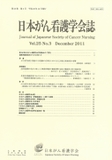Japanese
English
- 販売していません
- Abstract 文献概要
- 参考文献 Reference
- サイト内被引用 Cited by
要旨
訪問看護師の,抗がん剤による職業性曝露の健康影響の認知と,曝露防止策の実施状況を明らかにすることを目的に,郵送法で質問紙調査を行った.全国の訪問看護ステーション1,045施設の訪問看護師,各1名を対象とし,抗がん剤の職業性曝露による健康影響の認知,がん化学療法中の患者への訪問看護の経験,曝露防止策について調査した.385施設から回答が得られた(回収率37%).曝露による健康影響を認知している者は31%,がん化学療法中の患者の訪問看護の経験者は20%(75名)であった.訪問の経験があっても61%は健康影響を認知していなかった.がん化学療法中の患者の訪問看護の内容は抗がん剤点滴の抜針や,患者の排泄物の処理など曝露の危険性のある行為も含まれていた.しかし,がん化学療法中の患者の訪問看護の経験がある75名中,何らかの曝露防止策を講じていたのは20%(15名)で,患者や家族へ曝露防止策についての説明をしていたのは12%(9名)であった.健康影響の認知と防止策,患者と家族への説明の有無には関連があり,認知している者のほうが防止策や説明をしている割合が高かった.外来がん化学療法を受ける患者は年々増加し,訪問看護でも,このような患者へのかかわりは増えると予測される.したがって,訪問看護師も抗がん剤取り扱いによる曝露の影響を十分に認知し,曝露防止策を講じ,さらに患者・家族への指導ができるよう教育の促進やマニュアルの整備が必要と考えられた.
Abstract
The purpose of this study was to investigate whether or not Japanese visiting nurses were aware of the potential hazards of occupational exposure to anticancer drugs, and to learn if Japanese visiting nurses utilized preventative measures while working with anticancer drugs and patients. A self-rating questionnaire was mailed to Japanese visiting nurses at 1045 visiting nursing service stations, and 385 subjects successfully completed the questionnaire.
The results showed that 31 % of the Japanese visiting nurses were aware of their occupational exposure to anticancer drugs and the related health risks. Approximately 20 % of the nurses(75 nurses)working in nursing services had experience using anticancer drugs, but 61 % of them were not aware of the actual potential hazards of occupational exposure. The Japanese visiting nurses performed work with hazardous items although they had not been given any authorized procedures. This work consisted of doing things such as removing needles from patients and handling waste from patients who had been given anticancer drugs, but only 20 %(15 of 75 nurses)reported using preventative measures, and only 12 %(9 of 75 nurses)informed patients and the patients' families of this fact. Japanese visiting nurses who were aware of the potential hazards of occupational exposure had already performed this type of work at some time prior, so they were already aware of the health risks, but there were more nurses that had not been informed at all. This information can be seen in the chi-square test.
Patients who are using anticancer drugs are increasing throughout Japan yearly, and this can also be said for the number of patients within hospitals. Our results indicate needs for improving the work practice guidelines, education for visiting nurses handling anticancer drugs about awareness of occupational exposure and preventative measures, and similar information for patients and their families.
Copyright © 2011, Japanese Society of Cancer Nursing All rights reserved.


